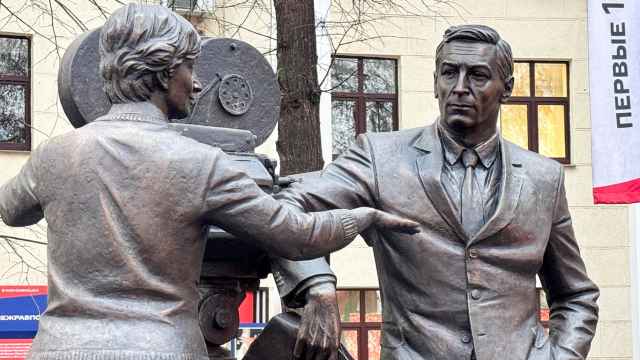It is an accepted fact that theater on film is not theater at all. I don't know a director or actor who does not cringe at the mere thought of someone watching their work on video. There is an accepted genre of televised theater, but it is usually a sad reflection of the real thing.
What about radio? Radio in Russia is still a popular medium. And like television, it broadcasts a good deal of nonsense. Still, there is more room for unorthodox programming on radio than on television.
In the Soviet era, radio was an extremely popular form of entertainment and it often broadcast popular theatrical productions. In the 1990s, I was told by more than one playwright that he or she was kept semi-solvent financially by Western or Eastern European radio stations recording and broadcasting their plays. BBC radio last year prepared a series of Russian plays in English translation for broadcast.
Thanks to my colleague Pavel Podkladov at Podmoskovye Radio, I recently learned about a web site that combines the media of radio-theater and internet.
You may want to skip the site's main page, which mostly plugs books and writings by the site's founder, the self-proclaimed Boris Karlov. You might also want to rush past some of the arcane and suspicious "political information," as Karlov calls it. But if rare audio recordings of historic theatrical productions are of interest to you, give this page a look. (Everything on the site is in Russian.)
The site collects more than 400 recordings of theatrical and literary works, some going back as far as the 1940s, some having been recorded in recent years. Not surprisingly, the bulk of the broadcasts come from the popular and powerful Maly Theater and the Moscow Art Theater between the 1950s and the 1970s. From the cache of shows at the Art Theater you can listen to the great Innokenty Smoktunovsky in Anton Chekhov's "Ivanov," the legendary Olga Knipper-Chekhova in "The Cherry Orchard," or the one-and-only Maria Babanova in Edward Albee's "All Over." From the past repertoire at the Maly Theater you can hear the great 1945 production of Alexander Griboyedov's "Woe From Wit" starring Mikhail Tsaryov, or the venue's popular 1978 production of "Mamure," starring the marvelously imperious Yelena Gogoleva.
Sound quality on all the performances that I sampled is excellent, although in some sound dropouts do occur. Performance qualities vary wildly. Some shows, like Alexei Arbuzov's famous "Tanya" from 1939, were clearly rerecorded later and with little inspiration. The recording of "Mamure," on the other hand, with director Boris Lvov-Anokhin reading the author's directions himself, is lively and entertaining.
This site provides the opportunity to connect with the work of legendary artists long gone. These include one of the great Anatoly Efros's first productions &mdash Viktor Rozov's "In Search of Happiness" at the National Youth Theater; Vladimir Vysotsky performing in a dramatization of the Vasily Shukshin story "Beyond Bystryansky Wood;" and one of Georgy Tovstonogov's early productions at the Bolshoi Drama Theater in what was then called Leningrad &mdash Alexander Volodin's "Five Evenings." Interestingly, Vysotsky can also be heard performing in Efros's production of "Martin Eden" for the Theater na Maloi Bronnoi in 1976.
Contemporary drama is represented only spottily. However, there are some items of interest. Yevgeny Kamenkovich's production of Olga Mukhina's "YoU" at the Moscow Art Theater was not one his best outings, but it is still a landmark for being a staging of a major contemporary playwright at a major theater in an era when such things were almost nonexistent. Yelena Gremina, Nikolai Kolyada and Oleg Shishkin are among other contemporary writers to be found here.
One of the biggest curiosities is a 13-hour recording of Mikhail Bulgakov's novel "The Master and Margarita." It stars many of the actors who performed in Yury Lyubimov's famous production at the Taganka Theater, although this is a different work altogether. The research that the site manager has done into the origins of this prodigious, but somewhat mysterious, recording makes for interesting reading.
Still another noteworthy curiosity is the 20-minute recording of the infamous "Luka Mudishchev," Ivan Barkov's classic &mdash yes, classic &mdash pornographic poem from the 18th century. It is read here with a luxurious mix of irony and seriousness by the late St. Petersburg actor Igor Dmitriyev, who is best known for his performances of classy, hyperproper aristocrats.
Once you have opened the page of the work you wish to listen to, click on the blinking trash can below the photograph. This will either give you the option to open the file further in your own media or it will provide a direct link through Quicktime.
A Message from The Moscow Times:
Dear readers,
We are facing unprecedented challenges. Russia's Prosecutor General's Office has designated The Moscow Times as an "undesirable" organization, criminalizing our work and putting our staff at risk of prosecution. This follows our earlier unjust labeling as a "foreign agent."
These actions are direct attempts to silence independent journalism in Russia. The authorities claim our work "discredits the decisions of the Russian leadership." We see things differently: we strive to provide accurate, unbiased reporting on Russia.
We, the journalists of The Moscow Times, refuse to be silenced. But to continue our work, we need your help.
Your support, no matter how small, makes a world of difference. If you can, please support us monthly starting from just $2. It's quick to set up, and every contribution makes a significant impact.
By supporting The Moscow Times, you're defending open, independent journalism in the face of repression. Thank you for standing with us.
Remind me later.






